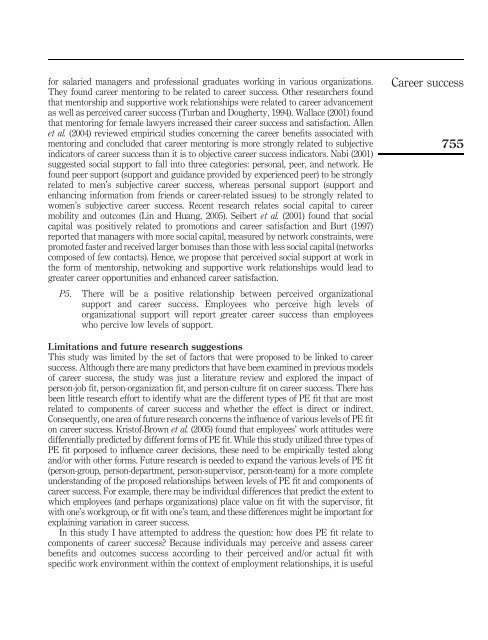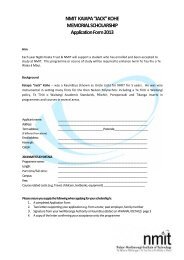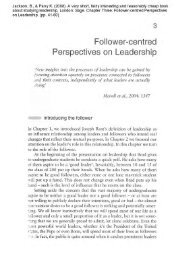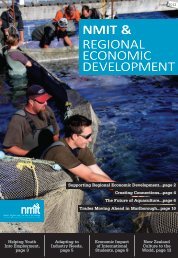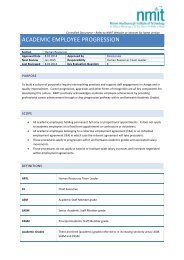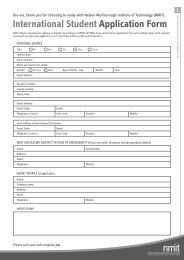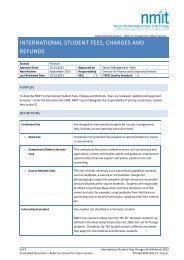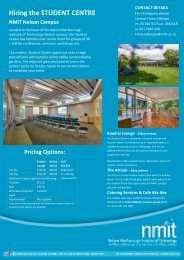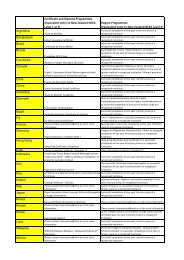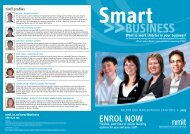Career success - 2007.pdf
Career success - 2007.pdf
Career success - 2007.pdf
Create successful ePaper yourself
Turn your PDF publications into a flip-book with our unique Google optimized e-Paper software.
for salaried managers and professional graduates working in various organizations.They found career mentoring to be related to career <strong>success</strong>. Other researchers foundthat mentorship and supportive work relationships were related to career advancementas well as perceived career <strong>success</strong> (Turban and Dougherty, 1994). Wallace (2001) foundthat mentoring for female lawyers increased their career <strong>success</strong> and satisfaction. Allenet al. (2004) reviewed empirical studies concerning the career benefits associated withmentoring and concluded that career mentoring is more strongly related to subjectiveindicators of career <strong>success</strong> than it is to objective career <strong>success</strong> indicators. Nabi (2001)suggested social support to fall into three categories: personal, peer, and network. Hefound peer support (support and guidance provided by experienced peer) to be stronglyrelated to men’s subjective career <strong>success</strong>, whereas personal support (support andenhancing information from friends or career-related issues) to be strongly related towomen’s subjective career <strong>success</strong>. Recent research relates social capital to careermobility and outcomes (Lin and Huang, 2005). Seibert et al. (2001) found that socialcapital was positively related to promotions and career satisfaction and Burt (1997)reported that managers with more social capital, measured by network constraints, werepromoted faster and received larger bonuses than those with less social capital (networkscomposed of few contacts). Hence, we propose that perceived social support at work inthe form of mentorship, netwoking and supportive work relationships would lead togreater career opportunities and enhanced career satisfaction.P5. There will be a positive relationship between perceived organizationalsupport and career <strong>success</strong>. Employees who perceive high levels oforganizational support will report greater career <strong>success</strong> than employeeswho percive low levels of support.<strong>Career</strong> <strong>success</strong>755Limitations and future research suggestionsThis study was limited by the set of factors that were proposed to be linked to career<strong>success</strong>. Although there are many predictors that have been examined in previous modelsof career <strong>success</strong>, the study was just a literature review and explored the impact ofperson-job fit, person-organization fit, and person-culture fit on career <strong>success</strong>. There hasbeen little research effort to identify what are the different types of PE fit that are mostrelated to components of career <strong>success</strong> and whether the effect is direct or indirect.Consequently, one area of future research concerns the influence of various levels of PE fiton career <strong>success</strong>. Kristof-Brown et al. (2005) found that employees’ work attitudes weredifferentially predicted by different forms of PE fit. While this study utilized three types ofPE fit porposed to influence career decisions, these need to be empirically tested alongand/or with other forms. Future research is needed to expand the various levels of PE fit(person-group, person-department, person-supervisor, person-team) for a more completeunderstanding of the proposed relationships between levels of PE fit and components ofcareer <strong>success</strong>. For example, there may be individual differences that predict the extent towhich employees (and perhaps organizations) place value on fit with the supervisor, fitwith one’s workgroup, or fit with one’s team, and these differences might be important forexplaining variation in career <strong>success</strong>.In this study I have attempted to address the question: how does PE fit relate tocomponents of career <strong>success</strong>? Because individuals may perceive and assess careerbenefits and outcomes <strong>success</strong> according to their perceived and/or actual fit withspecific work environment within the context of employment relationships, it is useful


